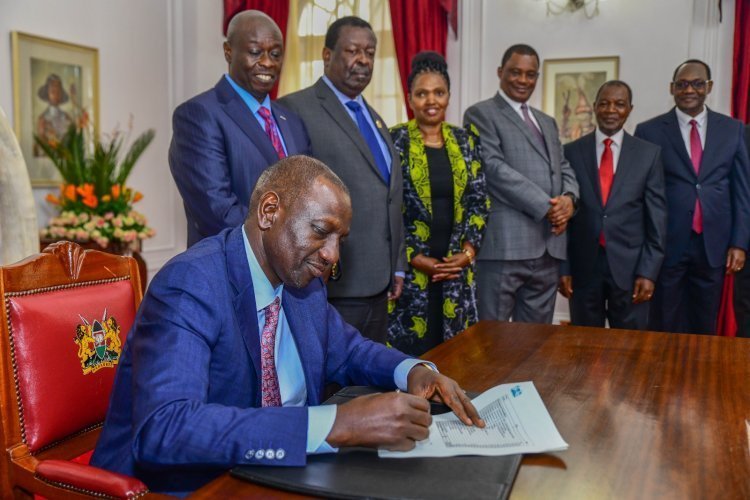Tax Measures That Will Take Effect From September 1
The new taxes set to take effect will join the likes of the Housing Levy, among the first wave of taxes to be implemented after the suspension of the Finance Act by the High Court was lifted.

Starting Friday, September 1, Kenyans will be forced to contend with the second wave of taxes introduced in the contentious Finance Act, 2023 with its impact traversing sectors such as cement, steel, paper, suppliers, digital and creative economy, and entertainment.
The new taxes set to take effect the day after this article was published will join the likes of the Housing Levy, among the first wave of taxes to be implemented after the suspension of the Finance Act by the High Court was lifted.
Viral Tea takes a look at the new taxes and measures that will take effect from September 1:
Digital Assets Tax
The Kenya Revenue Authority (KRA) will impose a three per cent levy on the trade of digital assets. A digital asset is anything identifiable that is created and stored digitally and has or provides value.
The new levy means that every person dealing in assets such as cryptocurrencies and non-fungible tokens (NFTs), data, images, videos and written content will surrender part of their transaction to the taxman.

Various forms of cryptocurrency on display. /FILE
“A person who is required to deduct the digital asset tax shall, within twenty-four hours after making the deduction, remit the amount so deducted to the Commissioner together with a return of the amount of the payment, the amount of tax deducted, and such other information as the Commissioner may require,” reads the Act signed by President William Ruto on June 26.
The law defines a digital asset as “anything of value that is not tangible and cryptocurrencies, token code, number held in digital form and generated through cryptographic means or otherwise, by whatever name called, providing a digital representation of value exchanged with or without consideration that can be transferred, stored or exchanged electronically, and a non-fungible token or any other token of similar nature, by whatever name called.”
While cryptocurrencies have continued to gain popularity globally in recent years, the uptake has been low in Kenya.
As a result, the new DAT has raised concerns among experts who argue that because there is no regulation governing the digital assets industry in Kenya, the new tax will be of no significance or benefit to the government.
Export and Investment Promotion Levy
Imported clinker, which is a raw material for the manufacture of cement, as well as finished iron and steel, will start attracting a 17.5 per cent Export and Investment Promotion Levy.
The new tax risks pushing up the cost of construction as the State moves to protect the local industry.
In addition, imported paper, sacks and bags will start attracting a 10 per cent export levy, affecting the supply chain and pricing.
Electronic Tax Invoice Management Systems (eTIMS)
Perhaps one of the most significant tax policies whose implications will be felt widely among suppliers is the enforcement of the electronic tax system.
The new system will thus give KRA the opportunity to monitor transactions taking place in the economy and stock levels held by companies to enhance tax compliance.
The Finance Act handed KRA the permission to establish an electronic system through which electronic tax invoices must be issued and records of stocks kept for purposes of tax compliance.
Those who fail to comply with the Electronic Tax Invoice Management Systems (eTIMS), which requires businesses to issue electronic invoices, risk paying two times the value of tax due up from the current penalty of Ksh100,000.
“Essentially what this provision is saying is that every business person has to be on eTIMS and this is the data that KRA will be picking and analysing in the determination of tax liabilities,” Robert Waruiru, the chairperson of the public finance committee at the Institute of Certified Public Accountants (ICPAK), told the Business Daily.
“So, you could be a supplier with a turnover of just Ksh500,000 annually but now what this means is that for your invoice to be accepted by KRA as the basis of an expense it has to be generated through the eTIMS platform.”
With e-TIMS, the KRA is using big companies to enlist small traders as taxpayers. Companies that pay taxes will be penalised for doing business with suppliers that do not issue them with electronic invoices.
The KRA will not accept invoices from suppliers not captured in the e-TIMS, an Internet-enabled tax register that relays real-time sales data to the taxman for firms registered to collect value-added tax (VAT).
Therefore, all businesses will be required to integrate their accounting systems with the KRA’s eTIMS to allow for the tracking of invoices and stock levels by the taxman.

Kenya Revenue Authority (KRA) offices along Mombasa Road. /FILE
Tax Amnesty
The new law has, however, handed taxpayers who had a tax liability consisting of tax principal, penalties and interests, some relief should the KRA determine that they paid the principal by the end of December 2022.
Those who will have paid their tax principal by the end of December 2022 will receive a full waiver on penalties and interests and those who will have paid part of the principal can enter into a payment plan to clear the difference by June 2024.
Meanwhile, the fate of the Finance Act 2023 lies with the Court of Appeal set to determine the Act's constitutionality, given that the new law also contains tax measures such as a 1.5 per cent housing levy and a 16 per cent VAT on fuel, with other tax measures set to follow in January 2024.

 admin
admin 




